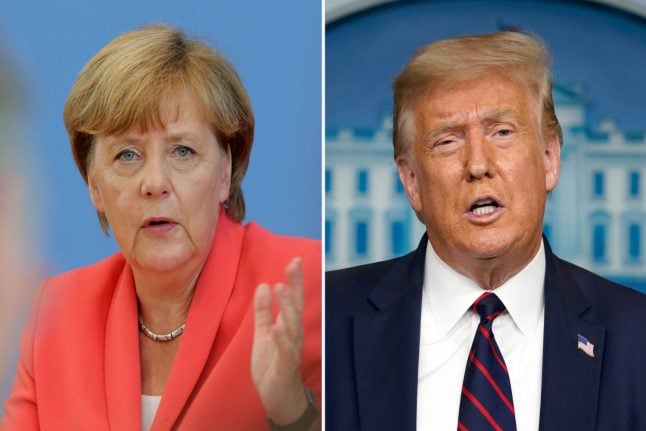Four years later, Trump's abrasive foreign policy moves, often unveiled in all-caps tweets, have alienated not just Germany but much of Europe.
“The transatlantic relationship is practically on life support,” said Sudha David-Wilp, a senior transatlantic fellow at the German Marshall Fund of the United States.
Even if Democratic challenger Joe Biden wins the November 3rd election, experts said there will be no magical healing of the EU-US rift.
READ ALSO: German-US relations after a year of Trump: what has changed?
Recent surveys by the Pew Research Center found that America's image among Europeans has plummeted to record lows, with just 26 percent of Germans now holding a favourable view of the superpower.
The “harsh judgement” can be partly attributed to the widespread belief that the Trump administration “mishandled the coronavirus”, said Bruce Stokes, an associate fellow at Chatham House, a British think-tank.
“Europeans look at America and think there are a lot of domestic issues that are just breaking the country apart and how can it be a good partner (at such a time)?” added David-Wilp.
'A foe'
From pulling out of the Paris Climate Agreement and the Iran nuclear deal to slapping tariffs on EU steel and aluminium, and defanging the World Trade Organization, Trump has dealt blow after blow to multilateralism, a much-valued European approach to global challenges.
He stunned allies by describing the European Union as a foe on trade, and “scared people” by cosying up to Russia, Stokes said.
Germany, which currently holds the EU presidency, has been a regular target of Trump's anger, often over its failure to meet NATO's defence spending targets.
But on a personal level too, there is no love lost between Europe's most powerful woman, who is leaving office next year, and the real estate tycoon in the White House.
Unlike French President Emmanuel Macron who tried to woo Trump with a military parade and a dazzling Eiffel Tower dinner before ties soured, Merkel never went out of her way to court the mercurial American.
Relations turned even frostier in June after she rebuffed an invite for a G7 event in Washington over coronavirus concerns. Soon after, Trump announced he was slashing the number of US troops stationed in Germany.
“He has real trouble dealing with strong women,” Stokes said.
Yet Trump does not just have an aversion to the Chancellor, “but probably also to Germany,” said Constanze Stelzenmüller of the Brookings Institution think tank in Washington. “Even he himself probably does not know where this is rooted.”
But Trump has made some friends on the continent. Hungarian premier Viktor Orban, who shares his anti-immigrant sentiment, is openly backing him for reelection.
Poland, which stands to benefit from Trump's troop reshuffle, has experienced “a US re-engagement” and shares Washington's opposition to the controversial Nord Stream 2 pipeline between Russia and Germany, said Justyna Gotkowska from the Centre for Eastern Studies (OSW).
If Biden wins

Biden and Trump meeting in February 2013 during one of then President Obama's visits to Berlin. Photo: DPA
Should Biden win, he ” will see the need to revitalise relationships with allies,” said David-Wilp.
Expect the former vice president to make a trip to Europe early on, rejoin the climate pact and restart nuclear talks with Iran, experts say.
But areas of friction will remain on military spending, Nord Stream 2, and Washington's campaign against Chinese tech giant Huawei.
In the dispute over German defense spending, Trump announced the withdrawal of around a third of the U.S. soldiers stationed in Germany.
A Biden spokesman called this “a gift for (president) Vladimir Putin” and announced that Biden would “review” the decision after an election victory.
Faced with a Covid-19 battered economy, Biden will probably eschew Trump's more protectionist tendencies but some sort of “America First” vision for sensitive industries will likely live on.
“Europeans have to understand that a Biden administration is going to be so domestically preoccupied,” said Stokes.
The career politician is therefore expected to surround himself with seasoned foreign policy officials who will “even more than normally” be relied upon “to pull things back together, but hopefully also chart a new course” with Brussels, he added.
Should Trump be reelected, expect “a great sucking in of breath” across European capitals, Stokes said, and “another four years of a very rocky ride”.
READ ALSO: Inside the German town with Trump family ties and what it really thinks of him
But even under Trump 2.0, it is “entirely possible” for the US and EU to form a united front when it's in their self-interest on issues such as the coronavirus or China policy, Stokes said.
Peter Beyer, Merkel's transatlantic coordinator, recently told AFP that a “new Cold War” between Washington and Beijing had already begun, and that Europe should “stand shoulder-to-shoulder” with the US to face a rising China.
'Jolted'
An unintended side effect of the Trump turbulence has been the growing realisation that Europe must speak and act more as one.
“Trump definitely jolted things,” said David-Wilp.
The bloc's successful negotiation of a huge coronavirus stimulus package, spearheaded by Merkel and Macron, suggests a new impetus for closer cooperation and a reinvigorated German-Franco partnership.
Trump's attacks painting Europeans as taking advantage of the US have spurred higher NATO contributions, and a greater acceptance of burden-sharing on security issues.
There are plenty of obstacles ahead for the 27-member club with its disparate interests, not least the impending Brexit turmoil and elections looming in key member states.
“But if one wants to say the glass is half-full, the Trump presidency may have helped accelerate European unity,” Stokes said.




 Please whitelist us to continue reading.
Please whitelist us to continue reading.
So, twice in the last 100 years the US has “overlooked” Germany’s starting of the two biggest wars in history. We paid in lives; we paid in billions (probably trillions of 2020 dollars) of dollars and deutschmarks. Yet now you’re so fragile that 4 years of Donald Trump have ruined the relationship forever? I have no words.